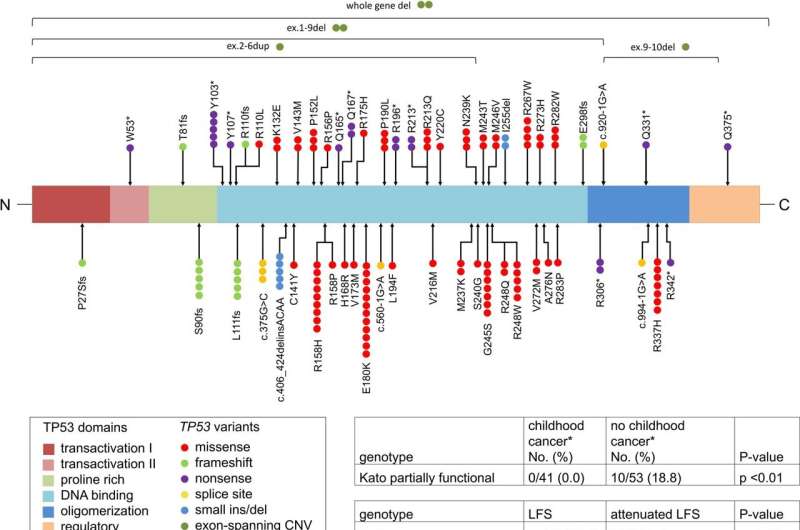Spectrum of TP53 germline variants and statistically significant genotype-phenotype correlations. Colored spheres refer to different patients harboring the corresponding variant. Note: Y103* is based on two different nucleotide substitutions; whole gene deletions include two gross deletions with differing breakpoints. The genotype–phenotype correlation was based on data from 94 families. CNV, Copy number variation. Credit: Journal of Hematology & Oncology (2022). DOI: 10.1186/s13045-022-01332-1
Li-Fraumeni syndrome (LFS) is a cancer predisposition syndrome that is caused by pathogenic TP53 variants and is associated with a greatly increased cancer risk. It represents one of the most important genetic causes of cancer in children and adults. Modern DNA sequencing methods are repeatedly uncovering pathogenic TP53 germline variants in individuals who do not meet previously established clinical LFS testing criteria. This has led to a "Li-Fraumeni Spectrum" classification that reflects the disease spectrum and takes into account atypical and attenuated LFS courses.
The new classification has now been applied for the first time using data from the German Cancer Predisposition Registry. In the study led by Professor Dr. Christian Kratz, Director of the Department of Pediatric Hematology and Oncology at Hannover Medical School (MHH), the research team analyzed factors that influence the cancer risk within the Li-Fraumeni spectrum. In the process, the researchers were able to demonstrate significant differences in the TP53 variant spectrum in patients with severe disease compared to patients with less severe disease courses.
The type of TP53 variant is decisive
"Differences in the severity of the disease courses correlate with the underlying TP53 variant type," explains Dr. Judith Penkert, first author of the study, which was published in the Journal of Hematology & Oncology.
"Our data suggest that in the future, more comprehensive genotype-phenotype correlations in large, international cohorts could enable more accurate cancer risk prediction," says Penkert from the Institute of Human Genetics, who is currently conducting research in Professor Kratz's team.
A total of 141 people from 94 families with disease-causing TP53 variants were analyzed. "73 families fulfilled the criteria for an LFS. In 21 families we were able to diagnose an attenuated LFS. According to previously used LFS test criteria, the diagnosis would not have been missed in these individuals," says Penkert.
LFS test criteria should be adapted
"Our results help to better predict the cancer risk associated with specific TP53 variants in the future, so that cancer surveillance can be adapted to the individual risk," says Kratz.
"The finding that a substantial proportion of patients are missed when using the previously established LFS test criteria suggests that the criteria need to be revised," says Professor Kratz, who, besides others, was in involved in the development of the Li-Fraumeni spectrum classification.
More information: Judith Penkert et al, Genotype–phenotype associations within the Li-Fraumeni spectrum: a report from the German Registry, Journal of Hematology & Oncology (2022). DOI: 10.1186/s13045-022-01332-1
Provided by Medizinische Hochschule Hannover























